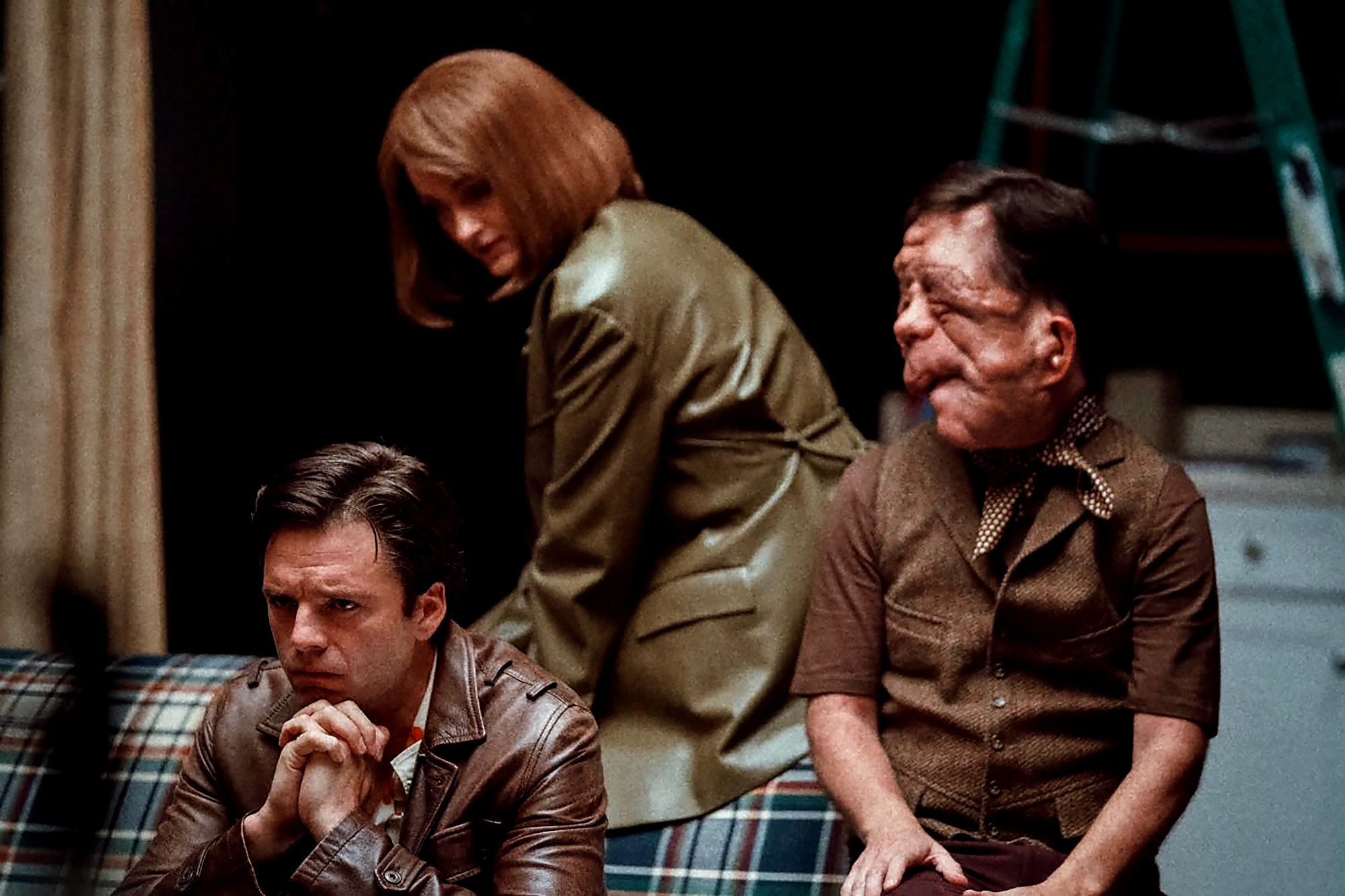
As a cinephile with a deep appreciation for films that challenge and provoke, I found “A Different Man” to be a captivating journey through the labyrinth of identity, art, and culture. Writer-director Aaron Schimberg has once again demonstrated his extraordinary ability to dissect societal norms and biases in a way that is both thought-provoking and entertaining.
In the intriguing, humorous, and exceptionally well-acted film “A Different Man,” directed by Aaron Schimberg, the delicate, anxious character of a New Yorker is revealed as bandages are removed from an experimental facial transformation starring Sebastian Stan. This unsettling dreamlike scenario evokes Rod Serling’s most thought-provoking humor, while also incorporating visual cues from various decades known for their disruptive entertainment: the eerie horror noir of the 1930s and ’40s, the neurotic comedy of the ’70s, and the raw urban life portrayals of the ’80s independent cinema.
In its unique perspective, “A Different Man” aligns with Schimberg’s enduring interest in the fragility of identity. If you’ve witnessed his swift and intelligent 2019 production “Chained for Life,” a story about the pretensions that plague a low-budget film production featuring actors with disabilities, you understand how acutely Schimberg notices everyday slights and subtle prejudices. Moreover, as a connoisseur of various cinematic forms, Schimberg ensures to incorporate an additional dimension: the significant role culture plays in shaping our perceptions of others and our interactions within society.
Encountering Edward (Stan), a man with severe facial deformities who maintains a quiet demeanor, suggests he holds a rather resigned perspective on life. Society often perceives him as a curiosity and Edward seems to occupy a marginalized position within it. Despite his profession as an actor, appearing in a training video that instructs employees on how to interact with coworkers who have facial differences (and is as awkwardly uncomfortable as one might imagine), it’s unclear if Edward recognizes himself as an artist. His job might as well be titled The Solitary Man in a Dilapidated Apartment, where a bothersome stain on the ceiling serves as an irritating colleague.
Initially, however, he receives some positive, sometimes flirtatious interest from Ingrid, the stylish and intelligent new neighbor next door (Renate Reinsve, who rose to fame in “The Worst Person in the World”), who identifies as a playwright but hasn’t written anything yet. Edward has secretly been exploring a revolutionary medical treatment that would dramatically alter his face and change the course of his life. In this film by Schimberg, everyone is so attuned to culture that even Edward’s doctor suggests, “You could end up being part of a documentary one day.
In an agonizing evening, I made a startling discovery about the effectiveness of my treatment. As gooey, gruesome chunks of my face peeled away, revealing a mirror image strikingly similar to Sebastian Stan, I couldn’t help but feel a strange sense of intrigue. The next day, seizing this unexpected chance for reinvention, I introduced myself as “Guy” to the building superintendent, who had no idea who Edward was, and nonchalantly shared with him that Edward had passed away.

Without delay, Schimberg skips to a phase where Guy has become a successful real estate agent, boasting a high-end apartment, an office romance, and his good looks prominently displayed in the company’s glossy advertisements. However, during a casual stroll, he unexpectedly encounters his former neighbor, Ingrid, on the street. He finds himself drawn to her and follows her into a small theater. There, he learns that she is auditioning actors for her debut play, focusing on a tormented, emotional character named Edward – a role that, as imagined by the woman who slipped away, could be his destiny. Yet, this opportunity also presents potential perils.
Schimberg creatively reimagines John Frankenheimer’s 1966 film “Seconds” in a manner similar to “Beauty and the Beast.” Instead, he crafts a more peculiar and destructive path for his character, who undergoes a transformation. This protagonist finds himself ensnared in a cycle of self-disintegration as his past inevitably returns. Edward, originally genuine, gave that up to become the ordinary “Guy,” only finding acceptance when donning the guise of his former self.
Instead of directly handling the complexities of the story, trust the creative journey and bring in Adam Pearson, who plays Oswald (known for “Under the Skin”), Guys’ understudy who has neurofibromatosis, to add depth to these fractured issues. Ingrid, constantly seeking ethical integrity (as well as positive critiques and a full house), increasingly leans on the sage advice and warm charisma of Oswald. Despite his physical resemblance to Edward, Oswald’s charming self-assurance and fulfilling life contrast starkly with the movie’s initial half, which portrays Edward as morose. Similarly, the emergence of Guy’s hidden traits – jealousy and greed – is brilliantly highlighted by Stan through each brooding scowl.

The Kafkaesque reversal-of-fortune humor that follows — centered on how outgoing, beloved Oswald’s mere presence pours salt on Guy/Edward’s identity crisis — is as shrewdly conceived a comic bad dream as we’ve gotten since the heyday of “Zelig”-era Woody Allen or Charlie Kaufman (whose film “Synecdoche, New York” this feels like a cousin to). Adding to the movie’s throwback mood is Wyatt Garfield’s grainy 16mm photography and Umberto Smerilli’s striking dirge of a score, both of which go a long way toward establishing an unforgiving, lose-yourself metropolis, which occasionally put me in mind of Roman Polanski’s “The Tenant.”
However, there’s a silver lining in this cautionary tale, and it’s the potential success of actor Pearson, who was brilliantly cast in “Chained for Life.” His captivating charm brings depth to the script’s themes. With his remarkable performance in “A Different Man,” which might mark the end of disability-themed satires, let’s hope he gains enough recognition to build a career based on his versatility – a shift that would be truly refreshing.
Read More
- Clash Royale Best Boss Bandit Champion decks
- Vampire’s Fall 2 redeem codes and how to use them (June 2025)
- Best Arena 9 Decks in Clast Royale
- Country star who vanished from the spotlight 25 years ago resurfaces with viral Jessie James Decker duet
- World Eternal Online promo codes and how to use them (September 2025)
- JJK’s Worst Character Already Created 2026’s Most Viral Anime Moment, & McDonald’s Is Cashing In
- ‘SNL’ host Finn Wolfhard has a ‘Stranger Things’ reunion and spoofs ‘Heated Rivalry’
- Solo Leveling Season 3 release date and details: “It may continue or it may not. Personally, I really hope that it does.”
- M7 Pass Event Guide: All you need to know
- Kingdoms of Desire turns the Three Kingdoms era into an idle RPG power fantasy, now globally available
2024-09-20 16:31